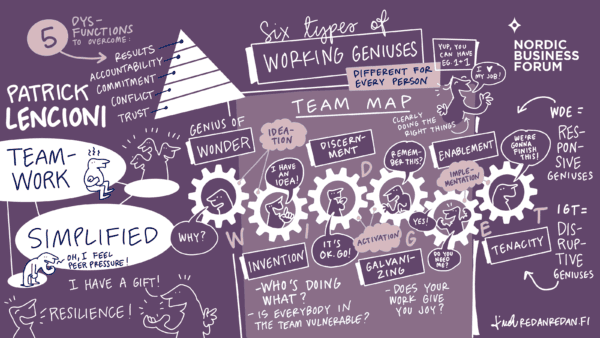2Oct2023
Consider this scenario: You are given one of the most precious gifts in your life, but you never open it. Happily, Patrick Lencioni, a best-selling author and the co-founder and president of the Table Group, presented in the opening keynote at the Nordic Business Forum 2023 a way to unlock this gift and revolutionize our perspectives on life and teamwork.
Joyful and Productive Living
“Whether starting a company, running a corporation, or remodeling your house, there are six types of work required in anything we do, which I call ‘working genius,’” stated Patrick. “If you don’t know what your geniuses are, how can you get the most joy and energy out of your work and life? We weren’t put on Earth to do things that make us miserable, yet many find ourselves doing that.”
The working geniuses are wonder, characterized by asking big questions about the world; invention, which entails creating something from nothing; discernment, signifying the gift of judgment; galvanizing, a trait possessed by those who excel at inspiring and motivating others; enablement, manifests in individuals who derive fulfillment in being indispensable; and tenacity describes people who excel in overcoming obstacles and meeting targets.
When wonder and invention combine, it results in ideation. When discernment and galvanizing come together, they create activation. Finally, enablement coupled with tenacity leads to implementation. “Many companies transition from ideation to implementation, but without igniting excitement for activation, the idea often fails to materialize successfully,” he warned.
Patrick, who published The Six Types of Working Genius: A Better Way to Understand Your Gifts, Your Frustrations, and Your Team, in 2022, revealed the flip side of working genius, explaining there’s ‘working competency,’ referring to tasks you can perform but that don’t necessarily fulfill you, and ‘working frustration,’ which saps your happiness.
“The more time spent in your area of genius and the less time spent in your area of frustration, the more productive and happier you’ll be. I want people to feel less guilt about themselves when they’re not good at things that aren’t their genius and be less judgmental of others. When you’re trying to pretend like you can handle it all, all you do is lose credibility. Burnout happens because you’re doing stuff that drains the joy and energy, rather than the things that feed you.”
Building Trust and Productivity
Once we’ve grasped our area of working genius, we can openly leverage these newfound strengths in our workplace, fostering trust within our teams. Nevertheless, Patrick referenced his renowned international bestseller, The Five Dysfunctions of a Team, published more than two decades ago, that some methods can undermine teamwork.
“When I talk about trust, I’m not talking about predictive trust based on predicting behavior. I’m talking about ‘vulnerability-based trust’ when team members are sincere, open, and emotionally naked about their strengths or weaknesses. If you have somebody that can’t be vulnerable, that never admits they’re wrong, it limits your team’s ability to grow.”
He recalled a collaboration with a sizable, well-known company. While the CEO possessed fame and intellect, his leadership skills left much to be desired. He ran the company with an imposing presence, but what stood out was the absence of feedback from anyone on his executive team. The root issue lay in the need for more trust within the leadership team, where individuals struggled to acknowledge their mistakes and exhibit vulnerability.
“It’s imperative to openly express disagreements without hesitation or concern for potential consequences. We mustn’t weigh the cost of holding back opinions. Instead, we should recognize the importance of voicing dissent when it matters.” However, trust and vulnerability among team members are a crucial prerequisite for this to work effectively. Without trust and openness, such candid conversations should be avoided.
Conflicts become healthy when individuals trust one another because they reflect a collective commitment to finding the right answers. In contrast, teams devoid of conflict may indicate deeper issues. With conflict, making informed decisions and achieving active commitment to a decision becomes more manageable.
The Path to Accountability and Results
“As a leader tasked with guiding your team through a challenging decision, your role is to encourage open debate. After you’ve listened to everyone’s perspectives, your responsibility is to arrive at a decision that reflects those opinions. The key here is that, even if individuals initially disagreed, they are more likely to support the final decision by actively participating and being heard. Understanding the decision-making process and having their voices heard typically leads to a high level of commitment from the team.”
Without commitment, Patrick stated that you won’t achieve accountability. When team members aren’t fully committed, it takes courage to confront them and demand more. In great teams, accountability is peer-driven, swift, and effective. Letting down peers is more impactful than disappointing the boss. Yet, leaders must lead by example in accountability for the team to follow suit.
Accountability is vital because it’s the only way to avoid the last dysfunction of a team, which is inattention to results. “While it’s common knowledge that focusing on results is crucial, the issue often lies in how executive teams define those results. Typically, they prioritize individual achievements, which is both understandable and dangerous. When organizations adopt this approach, they risk resembling the United Nations, where people lobby for their constituents.”
How often does team number one’s results have to be more important than team number two? This approach results in fighting unwinnable battles with other departments. One of the most exasperating aspects of organizational life is when departments like sales and marketing clash internally rather than collaborate to win customers from other companies in the market.
“Accountability for the team’s greater good is essential, underscoring the importance of commitment. We require this commitment because accountability wouldn’t make sense otherwise. This is why fostering healthy conflict is crucial; it’s the path to securing commitment. And to engage in conflict effectively, trust among team members is a prerequisite; you shouldn’t have conflict without trust,” concluded Patrick.

Visual summary of Patrick Lencioni’s keynote by Linda Saukko-Rauta
Want to get the full summary of the Nordic Business Forum 2023 speeches + extra content for reflecting on your learning? Download your free copy of the full Executive Summary and summaries from previous events!


